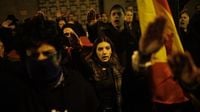On April 3, 2025, Isabel Medina Peralta, the leader of the neo-Nazi organization NS Bastión Frontal, faced trial in Madrid for inciting violence and hostility against Moroccan migrants and Muslims during a protest held outside the Moroccan Embassy. The Prosecutor's Office is seeking a sentence of three and a half years in prison and a fine of 3,240 euros for her actions, which are considered a crime against fundamental rights through incitement to discrimination and hatred.
The events in question occurred on May 18, 2021, when a protest, unauthorized by authorities, was organized by NS Bastión Frontal in response to a diplomatic crisis between Spain and Morocco. This crisis was triggered by a mass influx of migrants crossing the border into Spain, many of whom were unaccompanied minors. During the protest, Peralta addressed approximately 250 attendees, reportedly inciting violence and hostility with her declarations.
According to the Prosecutor's Office, Peralta's statements resulted in significant distress and negative impacts among the migrant community and those practicing Islam. Notably, slogans such as "It is not immigration, it is an invasion" and "Christian Spain and not Muslim" were chanted, with Peralta actively participating in the rhetoric. The protest was recorded by members of Bastión Frontal and streamed live on YouTube, with one video garnering at least 7,844 views and another 6,956 views.
The prosecution argues that Peralta's rhetoric constitutes a clear violation of the dignity of the targeted communities, linking immigration to racial and cultural replacement. In her defense, Peralta has claimed that her remarks were political critiques directed at the governments of Spain and Morocco. She has stated, "I respect all religions" and insists that her comments reflect the concerns of many Spaniards, asserting that she has not committed any crime.
Peralta's defense strategy includes distancing herself from being labeled as the leader of NS Bastión Frontal, describing the group as merely a "group of friends" that emerged during the pandemic to express certain ideas. She contends that her attendance at the protest was based on a call from current Member of the European Parliament, Luis 'Alvise' Pérez, whom she believed had secured the necessary permits for the gathering.
Throughout the trial, Peralta has attempted to downplay the inflammatory nature of her statements, referring to the phrase "death to the invader" as a "catchphrase" or a "tagline". She argued that such expressions have historical context, likening them to metaphors used in various conflicts throughout history. However, the prosecution maintains that her words contribute to the stigmatization of migrants and Muslims, exceeding the bounds of legitimate political criticism.
During her testimony, Peralta reiterated her belief in the concept of racial replacement, citing statistics from the National Institute of Statistics (INE) that indicate a decline in births among Spaniards compared to other populations. She stated, "The immigration ends the homogeneity of a society," framing her views as a legitimate concern for national identity.
The trial has drawn significant attention, particularly given Peralta's controversial history. In 2021, she was reported for making anti-Semitic remarks during a tribute to the Blue Division in Madrid, and in 2022, she was arrested at Frankfurt airport while attempting to enter Germany with a Nazi flag and a copy of Adolf Hitler's "Mein Kampf". More recently, in November 2023, she participated in protests on Ferraz Street, where she was photographed making a fascist salute.
As the trial continues, the Prosecutor's Office has maintained its request for conviction, asserting that the elements of a hate crime are evident in Peralta's actions and statements. The case has now been submitted for sentencing, with the court set to determine the outcome based on the evidence presented.
In a society grappling with issues of immigration and national identity, the trial of Isabel Medina Peralta underscores the ongoing tensions surrounding these topics in Spain. The implications of her statements and the potential consequences of her actions resonate beyond the courtroom, reflecting broader societal debates about race, culture, and the limits of free speech.
As the legal proceedings unfold, many are watching closely to see how the court will balance the rights of free expression against the need to protect vulnerable communities from hate speech and incitement. The outcome of this trial could set significant precedents for how similar cases are handled in the future, particularly in a climate where far-right ideologies are increasingly visible.









